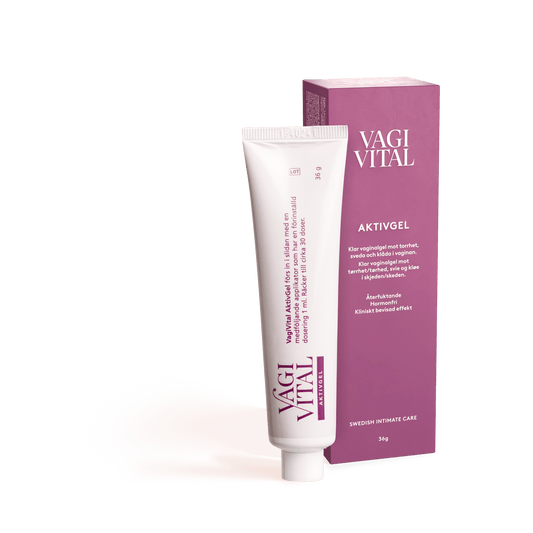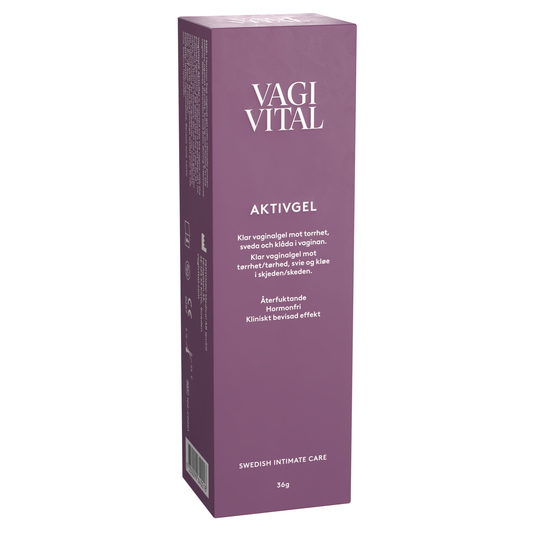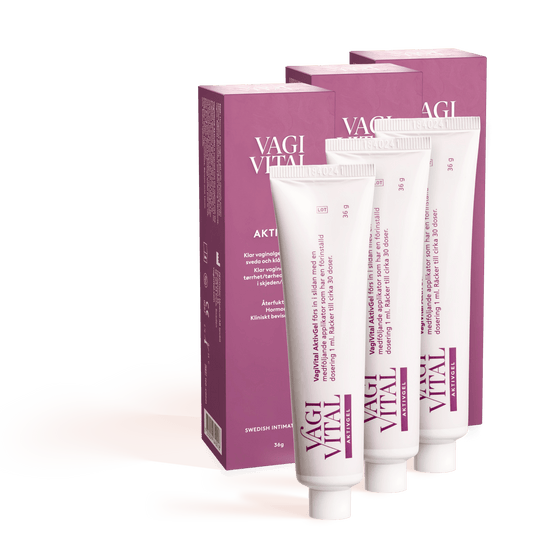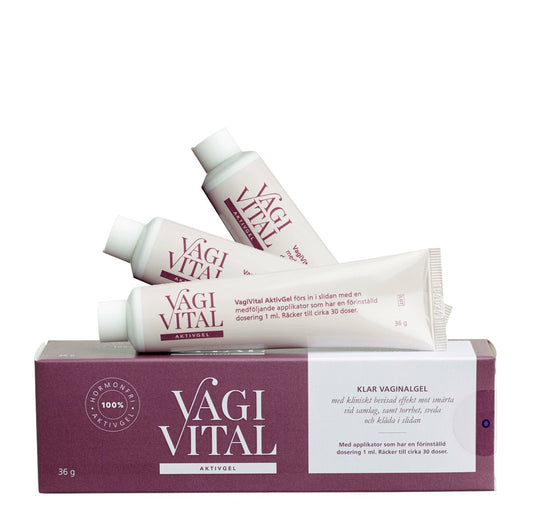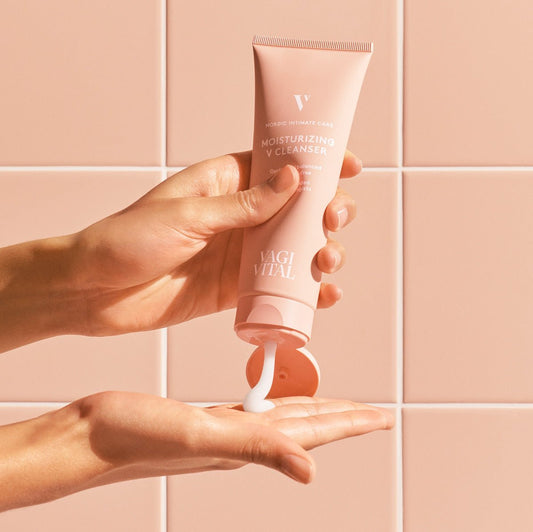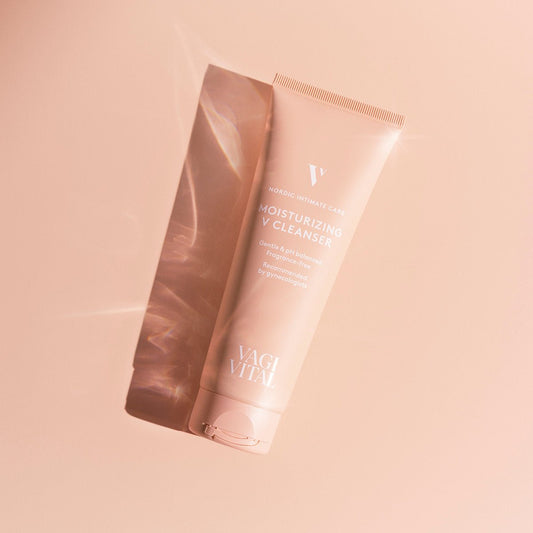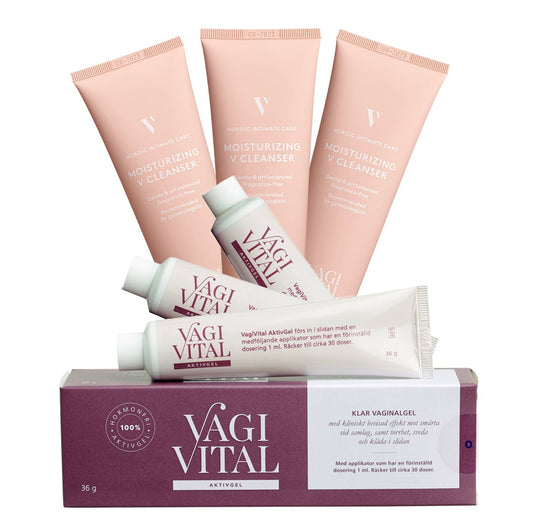Treatment of vaginal dryness during pregnancy
During pregnancy you will find that your body changes in many ways. One thing you may experience while expecting is vaginal itching and dryness. In this article we explain why this can happen and share tips on how you can treat it!
Every pregnancy is different and everyone is unique. The symptoms women experience therefore vary greatly between individuals and pregnancies. A common vaginal change that is not often talked about is dryness.
Vaginal dryness symptoms include itching, burning, irritation, and possibly pain during intercourse. As uncomfortable as it may be, it is not dangerous – and you are not alone as many women experience vaginal dryness during pregnancy. That said, it does not mean you have to suffer through it!
Vaginal dryness can have many different causes, so the first step is to make sure you know the cause to find appropriate treatment. Let's explore some of the most common causes!
4 of the most common causes of vaginal dryness during pregnancy
Hormonal changes
During pregnancy your hormones change – rapidly. Estrogen is the hormone responsible for keeping the vagina moist, so when your estrogen levels change during pregnancy, it can cause you to experience vaginal dryness.
Dehydration
If you feel dry "down there" there is a good chance your body needs more water to keep your vagina moist. Circulating fluid volume increases by about 50% during pregnancy, so make sure to hydrate more than usual to avoid vaginal dryness – and other side effects from dehydration.
Vaginal yeast infections
A study from 2015 (https://pubmed.ncbi.nlm.nih.gov/25916994/) shows that the risk of yeast infections (also known as candidiasis) increases during pregnancy. Symptoms include burning during urination and extensive itching. If you suspect you may be suffering from a yeast infection, contact your gynecologist for appropriate treatment.
Vaginal infections
Some vaginal infections can be caused by bacterial vaginosis and group B Streps (GBS). Common symptoms are pain during urination and itching. If you suspect you may have an infection, contact your doctor for appropriate treatment.
If you suspect you suffer from vaginal yeast infections or other types of vaginal infections, always talk to your doctor for appropriate treatment. But if the cause is due to hormonal changes or dehydration, there are treatments you can try at home to improve your vagina's well-being. Let's take a look at some of the treatments that can help relieve your vaginal dryness during pregnancy!
3 treatments you can do at home:
Hormone-free cream for the V-zone
Hormone-free vaginal creams can work wonders to increase moisture in the V-zone. During pregnancy, be sure to choose a non-hormonal vaginal cream. A study https://www.nature.com/news/2005/050502/full/050502-1.html showed that extra estrogen can be harmful to the fetus and lead to complications in the development of male children.
Remember to hydrate!
Dehydration is a possible cause of vaginal dryness, so make sure to drink plenty of water - preferably ice cold. To make it more fun, try adding a cucumber or lime to your water for variety. Another tip is to skip coffee as caffeine can dehydrate you. We promise your body will thank you!
Intercourse-related dryness
If you experience discomfort or pain during intercourse, there are several treatments that can relieve your symptoms. Something you might already have at home is coconut oil, which can be used safely inside and out. Other lubricants can also help your symptoms. If you want to try a lubricant, remember to choose a water-based lubricant. Avoid lubricants with glycerin listed as the first ingredient, as this can lead to pH imbalance during pregnancy.
Be careful and kind to your V-zone
You should always treat your vagina gently - especially during pregnancy. Some suggestions to help you be extra kind to your V-area include:
- Choose your underwear carefully. The best option is breathable cotton.
- Make sure to dry yourself properly with a towel after washing.
- Avoid walking around in sweaty underwear or wet swimsuits.
- Avoid scented lotions and perfumed soaps when cleaning the vaginal area. Choose products that are suitable for sensitive vaginas.
When does dryness disappear after pregnancy?
Vaginal dryness sometimes disappears after childbirth, but some women continue to experience it after pregnancy during breastfeeding. As mentioned above, estrogen is the hormone responsible for vaginal moisture. During breastfeeding, the body produces prolactin which stops estrogen production and can cause vaginal dryness.
In other words - it is common for vaginal dryness to continue during breastfeeding. If you suspect an infection or if the dryness worsens, always contact your doctor for medical advice.
Recommended products for you
- Choosing a selection results in a full page refresh.
- Opens in a new window.
